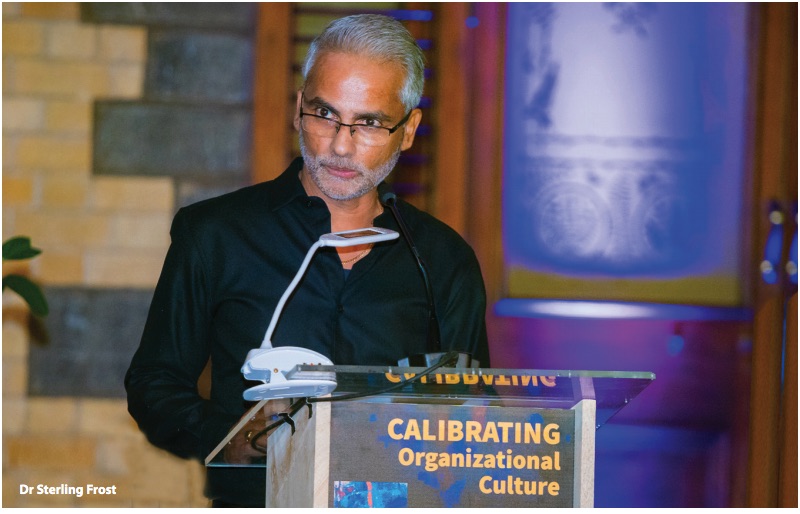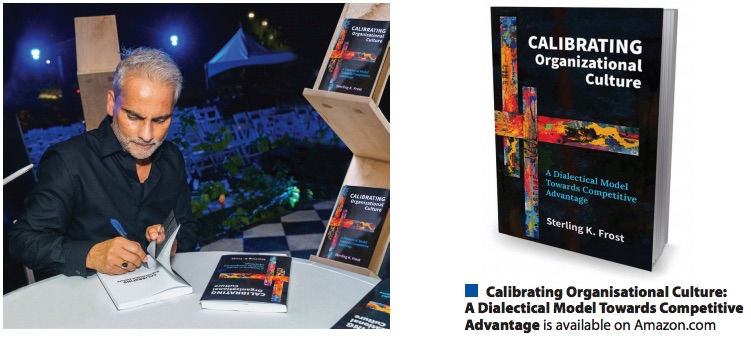Dr Sterling Frost ORTT is a very driven individual. He is the Group Deputy Chief Executive Officer of Operations and Administration at First Citizens Bank and UWI St Augustine Professor of Practice – Management Studies. He’s also Chairman of The UWI Development and Endowment Fund and other academic, government and civil society organisations.

Most recently, he was awarded the Order of the Republic of Trinidad and Tobago, the nation’s highest honour, for his contributions in banking, education and community service.
Now, Dr Frost is sharing some of the knowledge and experience that have helped him reach such profound heights with the publication of his book Calibrating Organisational Culture: A Dialectical Model Towards Competitive Advantage.
The ambitious project, which draws from his doctoral thesis, case studies, personal experience and in-depth interviews, guides institutions through 21st century optimisation of organisational performance and growth. The book is a blueprint not only for the Caribbean banking industry –where Dr Frost has over 40 years of experience – but for all sectors and industries seeking solutions in areas such as organisational behaviour and development, strategic leadership, performance and management, and human resource and cross-cultural management.
Calibrating Organisational Culture was launched in October with an event at Castle Killarney in Port of Spain.
“The question of the day is: how do we operationalise culture transformation?” Dr Frost asked the audience. “It’s a highly debated topic starting from the national development strategy all the way down to process improvement in organisations.”
He expanded, “For the most part, culture transformation remains conceptual, because many pontificate on the levers that need to be pulled, but no one knows exactly how and in what cadence to pull them. As professionals, we reduce culture to its parts and pursue culture transformation as a project: we define a problem, hypothesise a solution, implement and then declare benefits... perhaps a bonus for ourselves. But culture transformation is far from this linear dimension. Culture transformation is a continuous and contiguous exercise by nature. It is an evolutionary process which is driven by culture recognising itself, its opposing tendencies and reconciling both towards something new but yet familiar – it is an eternal dialectic.”
Dr Frost presented a metaphor for cultural transformation through comparison to parasitism and symbiosis in ecosystems.
“I think of culture as possessing its own ecosystem. Are we using our expertise to feed off the fat of the land? Or are we fully integrating ourselves and our various roles to benefit the larger ecosystem so much so that if the ecosystem is harmed so are we? Including yourself in the failures of society is the highest level of accountability,” he said.
Sharing his vast knowledge of institutional organisation is just one way that Dr Frost holds himself accountable to T&T society. Speaking at the book launch, Professor Patricia Mohammed, Emeritus Professor, UWI St Augustine, said, “He has made this knowledge now available not only for students but for his counterparts in business and industry. While it is an overdone cliché that everyone has a book in them, few people actually get around to producing one. The books we write emerge from a commitment to share knowledge with others. This book comes from his enmeshed experiences of learning, labour and life and from the individual and unique imperatives that have driven him to present to a reader on transformation and growth.”
Prof Mohammed’s sentiments were echoed by Dr David Rosenblatt, Senior Economic Adviser for the Caribbean at the International Development Bank (IDB) – a patron of the publication. In his review of the book, Dr Rosenbaltt noted that Frost’s approach to banking – a shift from focus on profits to a focus on people – was refreshing.
“[The book] provides a highly structured and systematic method for diagnosing how organisational culture affects a firm’s performance and how knowledge sharing, and knowledge management structures mediate that impact.”
Dr Rosenblatt added, “this goes well beyond ‘gut-feeling’ diagnostics and helps one to disentangle the specifics of what might need to change to improve outcomes. But as if that were not enough, Dr Frost also provides ‘gut-feeling’ qualitative information from carefully constructed interviews that supplement the empirical analysis.”
In his opening remarks, The UWI Chancellor Mr Robert Bermudez noted that Calibrating Organisational Culture was a canonical contribution to the industry:
“Building on other great thinkers in this field, Frost reminds us that knowledge is itself a key economic resource and the dominant and perhaps the only source of competitive advantage available to us currently. Those firms which effectively manage their knowledge resources can expect to reap a wide range of benefits such as reduced manpower and infrastructure costs, as well as improved corporate efficiency, growth in revenue, efficiency, customer satisfaction, and employee engagement.”
Insightfully, Mr Bermudez commented, “perhaps one of the key lessons that we have learnt as we have moved into the 21st century is that while the profit motive remains central, those we serve and those we employ are centrally important to reaching our economic goals.”
The book has also been endorsed by Dr Mark Rittenberg, Distinguished Teaching Fellow, Walter Haas School of Business, University of California, Berkeley who provided the foreword; as well as Professor C Justin Robinson, Pro Vice-Chancellor, Board for Undergraduate Studies, The University of the West Indies, and Justice Deborah Thomas-Felix President of the Industrial Court of the Republic of Trinidad and Tobago.
